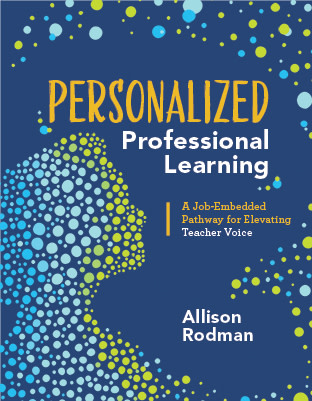References
Alliger, G. M., & Janak, E. A. (1989). Kirkpatrick's levels of training criteria: Thirty years later. Personnel Psychology, 42(2), 331–342. doi:10.1111/j.1744-6570.1989.tb00661.x
Assessment Training Institute. (2003). Assessment for learning: Thinking about assessment. Portland, OR: Pearson.
Brookhart, S. M. (2009). PLC series: Exploring formative assessment. Alexandria, VA: ASCD.
Brookhart, S. M. (2010). How to assess higher-order thinking skills in your classroom. Alexandria, VA: ASCD.
Cody, C. B., & Guskey, T. R. (1997). Professional development. In J. C. Lindle, J. M. Petrosko, & R. S. Pankratz (Eds.), 1996 review of research on the Kentucky Education Reform Act (pp. 191–209). Frankfort, KY: The Kentucky Institute for Education Research.
Currie, B., Krakower, B., & Rocco, S. (2016). 140 Twitter tips for educators: Get connected, grow your professional learning network, and reinvigorate your career. San Diego, CA: Dave Burgess Consulting.
Darling-Hammond, L., Chung Wei, R., Andree, A., Richardson, N., & Orphanos, S. (2009, February). Professional learning in the learning profession: A status report on teacher development in the United States and abroad. Dallas, TX: National Staff Development Council. Retrieved https://learningforward.org/docs/pdf/nsdcstudy2009.pdf
Easton, L. B. (2009). Protocols for professional learning. Alexandria, VA: ASCD.
Fisher, D., & Frey, N. (2007). Checking for understanding: Formative assessment techniques for your classroom. Alexandria, VA: ASCD
Fisher, D., & Frey, N. (2008). Better learning through structured teaching: A framework for the gradual release of responsibility. Alexandria, VA: ASCD.
Guskey, T. R. (2002). Does it make a difference? Evaluating professional development. Educational Leadership, 59(6), 45–51.
Guskey, T. R. (2003). What makes professional development effective? Phi Delta Kappan, 84(10), 748–750. doi:10.1177/003172170308401007
Guskey, T. R. (2005). Taking a second look at accountability. Journal of Staff Development, 26(1), 10–18.
Guskey, T. R. (2014, May). Planning professional learning. Educational Leadership, 71(8), 10–16.
Guskey, T. R. (2016). Gauge impact with five levels of data. Journal of Staff Development, 37(1), 32–37.
Guskey, T. R. (2017). Where do you want to get to? Effective professional learning begins with a clear destination in mind. The Learning Professional, 38(2), 32–37.
Guskey, T. R., & Yoon, K. S. (2009). What works in professional development? Phi Delta Kappan, 90(7), 495–500. doi:10.1177/003172170909000709
Hobby, R. (2004). A culture for learning: An investigation into the values and beliefs associated with effective schools. Philadelphia: Hay Group.
Holton, E. F. (1996). The flawed four-level evaluation model. Human Resource Development Quarterly, 7(1), 5–21. doi:10.1002/hrdq.3920070103
Kallick, B., & Zmuda, A. (2017). Students at the center: Personalized learning with habits of mind. Alexandria, VA: ASCD.
Kapp, A. (1833). Platon's Erziehungslehre, als Pädagogik für die Einzelnen und als Staatspädagogik [Plato's educational doctrine: As pedagogy for the individual and as a state pedagogy]. Minden, Germany: Essmann.
Killion, J. (2018). Assessing impact: Evaluating professional learning (3rd ed.). Thousand Oaks, CA: Corwin and Learning Forward.
Knapp, M. S., Copland, M. A., & Talbert, J. E. (2003). Leading for learning: Reflective tools for school and district leaders. Seattle, WA: Center for the Study of Teaching and Policy.
Knowles, M. S. (1980). The modern practice of adult education: From pedagogy to andragogy. New York: Cambridge Adult Education.
Knowles, M. S. (1996). Adult learning. In R. L. Craig (Ed.), American Society for Training and Development handbook (4th ed., pp. 253–265). New York: McGraw-Hill.
Lindeman, E. C. (1926). The meaning of adult education. New York: New Republic.
Lough, J. (2010). What expert teachers do: Enhancing professional knowledge for classroom practice. Crows Nest, NSW, Australia: Allen & Unwin.
McDonald, L. (2007). In from the cold: Developing training to impact. In A. Fanti (Ed.), Psychological science: Research, theory, and future directions (pp. 283–296). Athens, Greece: ATINER.
McDonald, L. (2014). Transfer of the learning: Teacher professional development. European Journal of Social and Behavioural Sciences, 1570–1574. doi:10.15405/ejsbs.140
Organisation for Economic Cooperation and Development (OECD). (1998). Staying ahead: In-service training and teacher professional development. Paris: OECD Publishing.
Patterson, K., Grenny, J., McMillan, R., & Switzler, A. (2002). Crucial conversations: Tools for talking when stakes are high. New York: McGraw-Hill.
Peterson, K. D., & Deal, T. E. (2009). The shaping school culture fieldbook. San Francisco: Jossey-Bass.
Quaglia, R. J., & Lande, L. L. (2017). Teacher voice: Amplifying success. Thousand Oaks, CA: Corwin.
Ramaswamy, V., & Ozcan, K. (2014). The co-creation paradigm. Stanford, CA: Stanford University Press.
Reeves, D. B. (2010). Transforming professional development into student results. Alexandria, VA: ASCD.
Senge, P. M. (2006). The fifth discipline: The art and practice of the learning organization. New York: Random House.
Senge, P. M., Cambron-McCabe, N., Lucas, T., Smith, B., Dutton, J., & Kleiner, A. (2012). Schools that learn: A fifth discipline fieldbook for educators, parents, and everyone who cares about education. New York: Crown Business.
Sinek, S. (2009). Start with why: How great leaders inspire everyone to take action. New York: Portfolio/Penguin.
Venables, D. R. (2018). Facilitating teacher teams and authentic PLCs: The human side of leading people, protocols, and practices. Alexandria, VA: ASCD.
Wiggins, G., & McTighe, J. (2007). Schooling by design: Mission, action, and achievement. Alexandria, VA: ASCD.
Yoon, K. S., Duncan, T., Lee, S. W., Scarloss, B., & Shapley, K. L. (2007, October). Reviewing the evidence on how teacher professional development affects student achievement. Issues & Answers (REL 2007-No. 033). Washington, DC: Institute of Education Sciences, U.S. Department of Education. Retrieved from https://ies.ed.gov/ncee/edlabs/regions/southwest/pdf/REL_2007033.pdf
Zmuda, A., Curtis, G., & Ullman, D. (2015). Learning personalized: The evolution of the contemporary classroom. San Francisco: Jossey-Bass.
Printed by for personal use only




